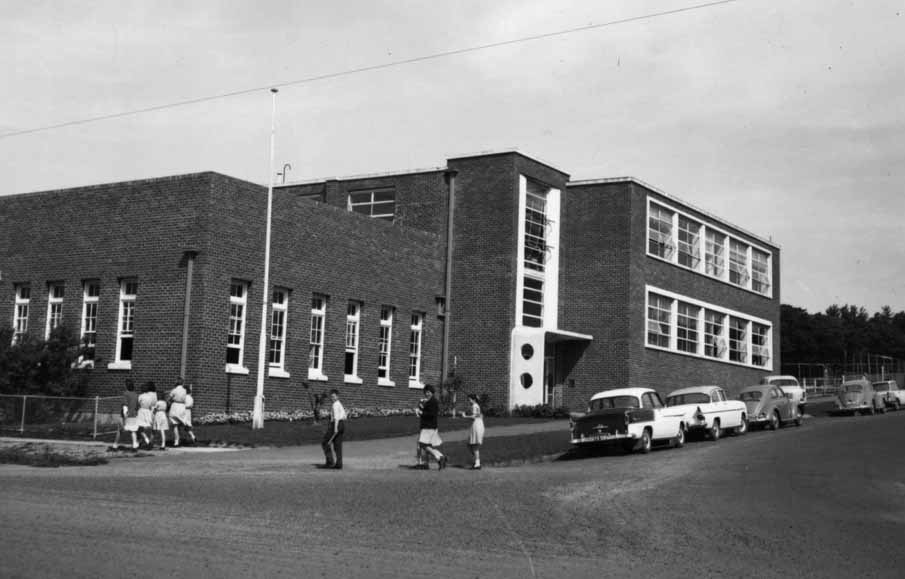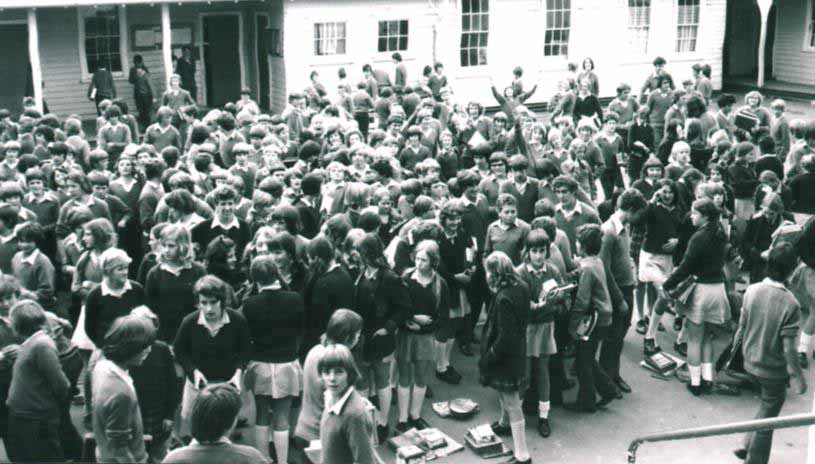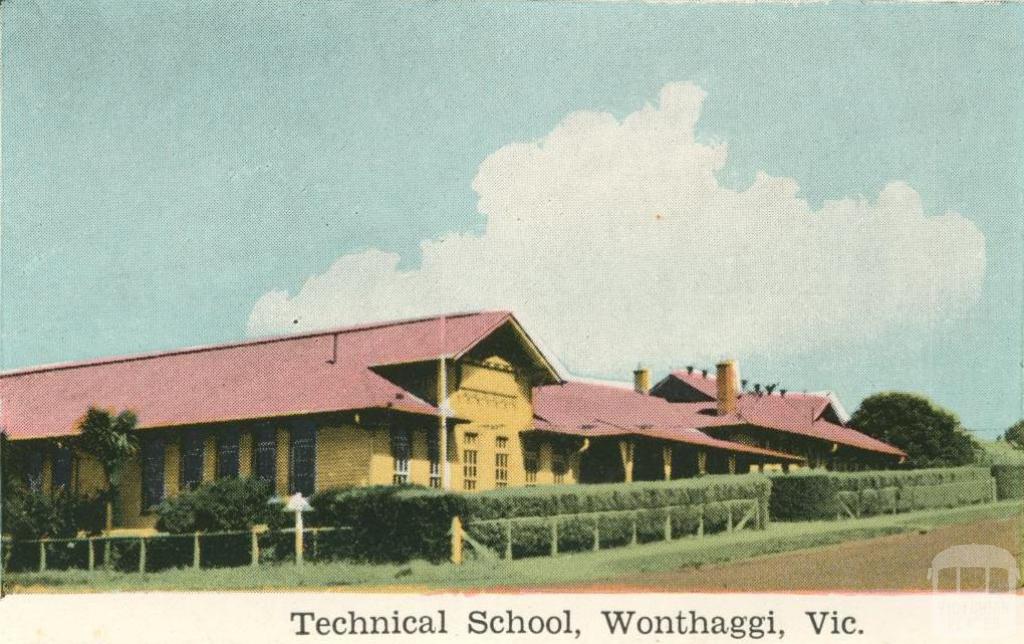
NEXT week the students and teachers of Wonthaggi Secondary College move to a sparkling new school. Not quite a century earlier, 110 eager pupils assembled for the opening of Wonthaggi’s first post-primary school
Wonthaggi Technical School, a weatherboard building on Watt Street, first opened its doors to students on Monday February 6 1922. The Powlett Express called the opening “successful” with an attendance of about 110 eager pupils who were “assembled and arranged according to grade”.
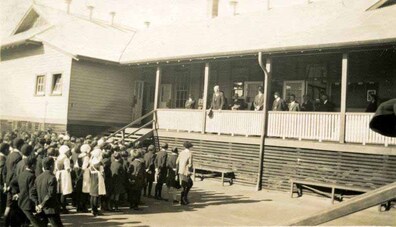 Early assembly, Wonthaggi Technical School, 1924. Note the orderly behaviour of students and the uniforms.
Early assembly, Wonthaggi Technical School, 1924. Note the orderly behaviour of students and the uniforms. The article goes on to say that Miss Norris, who comes with “excellent credentials” from Maryborough Technical School, would be in charge of commercial classes and Miss Pitt, daughter of Mr A. B. Pitt of the State Coal Mine, had been appointed junior clerk.1
The students numbered about 200 and were divided into junior and senior classes. The total included those enrolled in night classes already taking place with the assistance of the SCM at mine workshops temporarily on Saturdays and the Llewellyn Building at night.
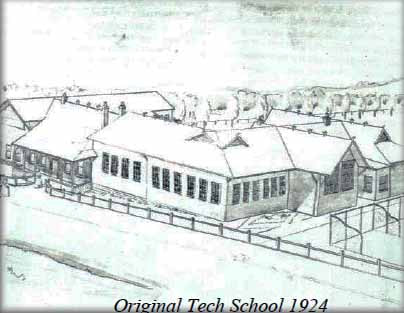
Many boys continued to the senior course with a syllabus of mining and electrical engineering, building and design, surveying, signwriting, and other “practical subjects, which fit a youth for a good start in life.” 2
The school also catered for girls who desired a sound education past primary school. One can assume, when looking at the junior girls’ uniforms, that as well as the same basic maths and English the junior boys took, the girls were expected to need domestic skills such as cooking and Sloyd (a method of education based on a link between manual skill and cognitive development). Then, at the senior level, they could choose to join the boys in a commercial course that involved elementary economics, commercial book-keeping, shorthand and typing.
Night classes for older students, often returned soldiers – boys who had missed out on their education and needed to catch up – also continued. One such class was taught by young and bright Miss Lilli Harden, who began her teaching career at the Tech in the early 1920s. She described her night class: “My first evening class was a surprise. I was sitting on the rostrum behind a desk wondering what sort of reception I would get when all of a sudden, what seemed like a squadron of soldiers burst into the classroom, shouting and arguing where to sit. ‘Where is she?’ a voice shouted. I stood on my toes and squeaked, ‘Here!’ I have never seen such astonishment as that on these lads’ faces. Out came combs as they tried to settle their hair. I came down among them and asked them to sit where they liked … Having heard a rumour that they were going to have a battle-axe for a teacher, they were prepared for war! As one lad put it, ‘Seeing the size of you, we’ve changed our minds.”
She got on so well with her “soldiers” that they began to ask if they could bring their girlfriends in as students. Soon she had a mixed class of earnest students who eventually became her friends. The class became known as “Miss H’s Matrimonial class.”3
The people of Wonthaggi were proud of their tech school when it was finally built and open. The miners who first came to work in the mine and create the town, many of whom had little chance for education themselves, knew the importance of learning. The first primary school had begun when Miss Somerset was appointed by the Victorian Education Department in February 1910 to the Powlett Coal Fields School, where she taught in the Baptist Church that had just been moved by bullocks and dray from Morwell to Tent Town. This was just three months after the mines began. By August of that year plans were being prepared for a proper state school to accommodate 150 students. By 1915, the Chief Inspector of Schools spoke at a public meeting in Wonthaggi about the advantages of a technical school to train tradesmen to work in the mines.
Seven years later, after a great tussle with state bureaucrats and council indecisiveness, the Tech was born. For almost 100 years the original weatherboard building along with additions and improvements has stood on Watt Street. It is where generations of Wonthaggi children got their start in life. The school is held dear by Wonthaggians. No matter what type of kid or how dedicated they were as students, there was always a teacher somewhere – in the woodwork room, in the library, on the footy field, in the science lab – who would give them a hand up, encourage them to keep going, giving them a chance at success.
Irene Williams writes in a letter to the editor of the Sentinel Times, “I have mixed feelings …the joy of progress is mixed with sadness.” She hopes the old building will “in the future serve the community and remind us of the proud history and unique beginnings of the town and the Technical School itself…” She goes on that the name of the new school will reflect this history. She writes, “The new school is not a new creation. It is the continuation of an entity that has a history to be proud of.”4
To commemorate the ending of the old school, Glen Sullivan has written/compiled a wonderful history of Wonthaggi Technical School called Deserve Success; the story of Wonthaggi Tech School. Glen was a student at the school and then a teacher as was his father, who was also a student and then a teacher. So complete was their involvement at the school and in the community that Glen and his father never taught anywhere else.
The story Glen has put together to commemorate the school is a wondrous compilation of stories, history, photographs, letters, memories. Even for those who did not go to the Tech, it is a great read for it reflects who the people of Wonthaggi are with their openness, their generosity, their energy and creativity, their sense of belonging to this unique town.
Get the book and read it. You’ll find yourself reading aloud to anyone who will listen and they will then grab the book from you to read for themselves. The book is on sale at the Railway Station Museum and the school.
1 Powlett Express: 10 Feb 1922, P 10
2 Powlett Express: 27 Jan 1922, P 22
3 Sullivan, Glen: Deserve Success, The story of Wonthaggi Tech School by Glenn Sullivan, 2019. P 26
4 Williams, Irene: “Don’t forget our history”, Sentinel Times, 5 November 2019, P 20
Class warfare: The 1960s finally came to Wonthaggi in 1968, writes Frank Coldebella, with a contingent of young teachers who didn’t use abuse, bullying or violence as teaching aids.
